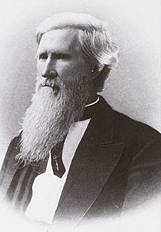 |
| Gov. Henry M. Rector, of Arkansas |
| Arkansas
was one of the so-called Upper South slave States, but she did not have
the commercial business ties to the North that North Carolina,
Tennessee, and Virginia had, and her governor in 1861, Henry M. Rector,
was a strong proponent of slavery, so there was little doubt which way
she would go when the secession crisis came to a shooting war.
Nonetheless, she moved slowly. The act calling for a vote on a
secession convention (as well as the votes for the delegates) was not
passed until mid-January, 1861. While the convention was somewhat
dominated by (conditional) Unionists, and did reject an early vote for
secession, they also passed a series of resolutions
that can only be described as Calhoun-esque, in that they call for the
President and Vice-President to be from different states as regards
slavery, i.e., one must be from a "free labor" state and the other must
be from a "slave labor" state. This document is the Act that
called for the election on February 18th, to decide if a convention
would be held, and, if so, who the delegates would be. |
|
|
An Act To provide for A STATE CONVENTION
SECTION 1. Be it enacted by
the General Assembly of the State of Arkansas, That the governor shall
issue his proclamation, ordering an election in all the counties in this state,
submitting to the people the question of “convention” or “no convention,'” to
be held on the eighteenth day of February, 1861, which election shall be
conducted as state elections are now conducted; Provided, That the
sheriffs of the several counties shall be required to give but ten days’ notice
of said election. Sec. 2. Be it further enacted,
That, at said election, the people shall also vote for a delegate or delegates
to said convention, and each delegate elected shall be made a special returning
officer, and shall bring up the certified vote of his county on the question of
convention or no convention, which vote from all the counties, shall be opened
by the governor, auditor, treasurer and secretary of state, or any three of
them, on the second day of March, 1861; and if, on counting the vote of all the
counties of this state, it shall appear that a majority of all the votes cast
are for a convention, then the governor shall immediately issue his
proclamation, requiring the delegates elected as aforesaid to convene in the
capitol on the following Monday, and organize themselves into a state
convention, by the election of a president, and such other officers as may be required,
and, in case of sickness, or any other unavoidable cause, to prevent any
delegate to the convention from getting to the capital, he shall have power to send
up the returns of his county by a special messenger, selected by himself. Sec. 3. Be it further enacted,
That the delegates, or special returning officers, shall be paid mileage at the
same rate that members of the General Assembly are paid, to be certified by the
president of the convention, if one be organized, and if not, the auditor is
required to issue his warrant for the same, taking the mileage accounts of the
members of the General Assembly as a guide to regulate the amount to which the
delegate, or delegates, coming from the same county, may be entitled. Sec. 4. Be it further enacted,
That the officers and members of said convention, if it shall he organized,
shall be paid the same per diem pay that the officers and members of this
General Assembly are paid; their accounts therefor to be certified by the
president of the convention, and the secretary shall certify the account of the
president. Sec. 5. Be it further enacted,
That each county in this state shall be entitled to elect as many delegates to
said convention as it is now entitled to members in the lower branch of the General
Assembly, and the qualifications for a delegate shall be the same as now
required for a member of the House of Representatives. Sec. 6. Be it further enacted,
That fifty members of said convention shall be necessary to constitute a quorum
to transact business. Sec. 7. Be it further enacted,
That if any seat in the convention, hereby provided for, be contested, the
convention shall have power to determine such contest, as the General Assembly has
to determine contests for seats in either house, in the manner now prescribed
by law. Sec. 8. Be it further enacted,
That upon the organization of said convention, it shall take into consideration
the condition of political affairs, and determine what course the State of Arkansas
shall take in the present political crisis. Sec. 9. Be it further enacted,
That a sufficient amount of money be, and the same is, hereby appropriated out
of the state treasury to pay the necessary expenses of said convention, should
one be held. Sec. 10. Be it further enacted,
That this act shall take effect and be in force from its passage. Approved, January 15th, 1861. |
Back to Civil War Chronologies (Main page) Back to Chronology of the Fort Sumter Crisis Source: Journal of Both Sessions of the Convention of the State of Arkansas Date added to website: January 8, 2025. |